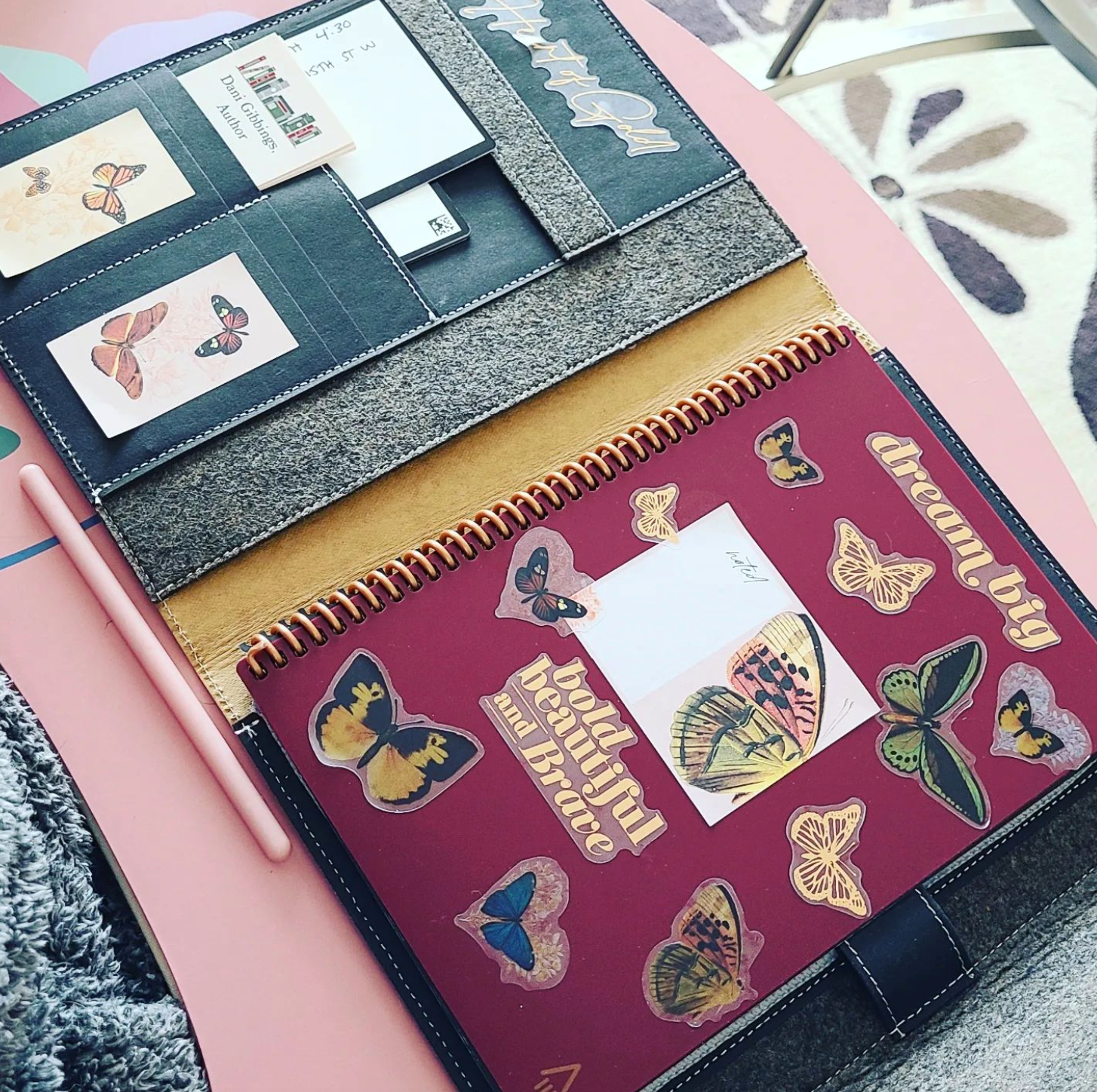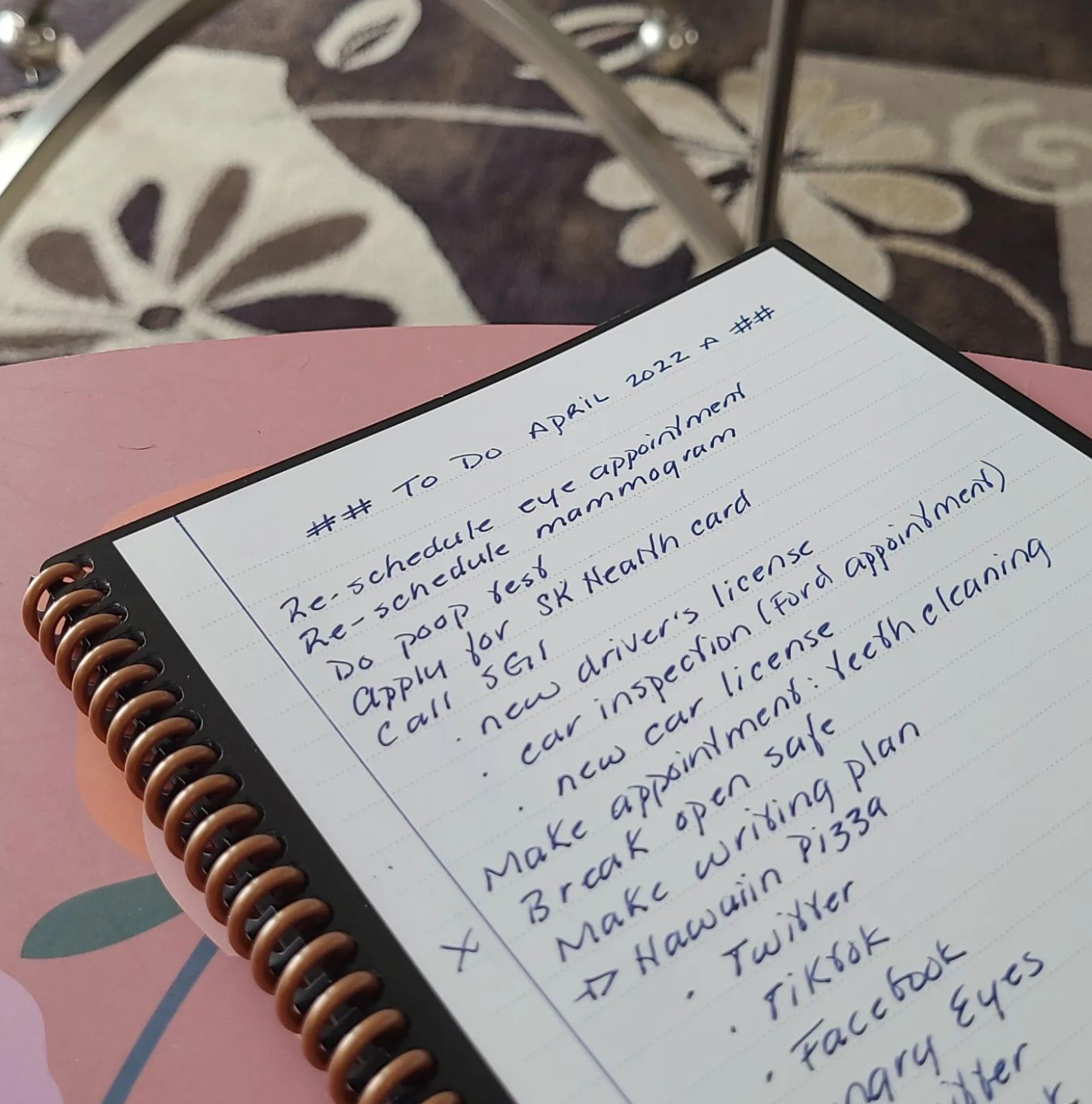I’ve been a planner for a long time. To do lists, daily planning, weekly planning — it’s all important to me. Even though I spend a lot of time on planning (and yes, sometimes a lot of money), it helps me stay somewhat organized.
More importantly, it helps me manage my ADHD. Sometimes.
But to be honest, my planning evolves.
Sometimes, I like to just write quick notes. Sometimes I decorate. There is no one planning system that works for me. I need to change it up to keep interested.
That’s probably why I end up buying so many different planners. I can’t even tell you how many Happy Planners I’ve bought over the years. I like that they are pretty. And I can use stickers. But I get bored.
I’m hoping with the Rocketbook notebooks, I’ll be able to avoid having to buy more planners. Once I have them all, of course (I’m only partly joking)!
What is a Rocketbook?
Rocketbook is the brand for a collection of erasable notebooks. You write on the special paper with a Frixion pen (they come in lots of colors and styles!). And when you’re done, you can erase it with a little water and the microfiber cloth that comes with each notebook.
But there’s more to it than that. Rocketbook has some really cool features.
Upload to the cloud
Each page of the Rocketbook has a little QR code in the bottom corner. Combined with a black outline, it allows you to scan your pages and then send them to whatever destination you choose. I like Google Drive but you can also scan to your email, Evernote, Dropbox, OneNote, OneDrive, Trello, Slack, Box, or your photos.
Choose to send your files as a JPG, PDF, or even a GIF.
If you’re uploading text, Rocketbook can even turn your handwriting into text with OCR Transcription! It’s not the best and I’m still experimenting with it but from what I understand, the more you use it the better it gets at transcribing your writing accurately.
Buy a planner, buy a template, or make your own planner
The Rocketbooks are great for journaling, taking notes, or even drawing. But they are also great for planners.
If you prefer a bullet journal type of planner, all you need is a blank notebook. Most of the basic notebooks come either lined or dot grid style. Personally, I think this is great. When I was using a bullet journal style planner, I used to change my mind a lot about what formats I liked for my layouts. In the end, I went through a lot of paper.
But you can also buy pre-made planners.
Rocketbook has a Panda Planner, an Everyday Planner, the Fusion, and an Academic Planner. Each one has different layouts, so you can choose the planner that works best for you.
If you need something else, you can find planner pages to download or you can buy them from Etsy.
Or if you really want to have your own style, you can make your own planner pages. You can print (or have them printer) using a laser printer (not a laser ink printer). Alternatively, you can draw the layouts using a Frixion pen and once you have them write, make them permanent with.a fine tip Sharpie.
If you choose to go the Sharpie route, make sure the ink is good and dry before you try erasing anything from it!
Get creative with a FrankenRocketbook!
If you’re like me, you won’t be satisfied until you have the exact notebook that you desire.
One of the reasons I wanted to convert to the Rocketbook was because I wanted less paper to carry around. With my previous systems, I had a planner for this and that and then other thing. And then there was journaling and story/book planning.
It was getting to be too much!
Now, I have two notebooks. Yes, two notebooks for everything.
The “notebook” size is a standard 8×11″. This is the same size paper as the BIG Happy Planner or a piece of loose leaf paper or printer paper, also known as letter size.
My notebook size book is being used for two things: my journal and everything fiction writing related. I’m planning out books and characters, recording my writing sprints, setting writing goals, and more. The only thing I’m not doing in this book that is writing related is planning.
One of the things I love about the Happy Planners is that I can take pages out and move them around. Why couldn’t Rocketbook have that feature?
Now, my FrankenRocketbook does!
I took all the pages out of my Rocketbook Core. I covered the edges with washi tape to give them more stability. And then I punched disc holes with my Happy Planner puncher.
The result?
A disc bound Rocketbook. The discs are from the smallest Happy Planner discs. The cover is from a big Happy Planner. Inside, I added a couple of dividers and some folders. The folders are great for holding my microfiber cloth and some stencils.
My second book is an “executive” size — same as an A5. I have line paper and I have the Everyday Planner in it. I took out the coils from both books, put them in the order I wanted them, and then put the cover and coil back on. I added a portfolio cover to it to contain a pen and my microfiber cloth.

This book is for planning and random notes about stuff I want to do. Like, I have a page with ideas for articles and stuff like that.
This is a smaller size, so it’s easy to carry with me.
The planner section has all sorts of pages for yearly, monthly, and weekly planning and several to-do list pages.
The Rocketbook is great for anyone changes their mind a lot!
This is likely the feature that I love about Rocketbook the most. I don’t have to stick with one format for planning, notetaking, or anything else. If I feel like trying something new, I can.
Once I have the basics (and I have a little more than the basics now, I’ll admit) I don’t have to spend $40 on a new planner or new pens. I just adapt what I’m doing in the books I have.
I want to try using a different kind of tracker? No problem. Just erase the one I’ve been using and draw a new one.
The Rocketbook is adaptable so it becomes what you need.
And all the pages are stored in the cloud (as long as you remember to send them there — don’t depend on the Rocketbook app to save your scans!) so you can keep what you want.
Oh, one more thing…
Index cards! Yes, I love index cards. I used to go through so many. But once they are used and I don’t need them anymore, they are garbage.
Cloud cards are great and they have so many uses.
I added some inside the folders of my writer’s book/journal and in the portfolio of my executive for quick notes.
I also use them for my serving job. Instead of writing down orders on paper, I use the cloud cards to write down orders. After, I just erase them. No more paper waste!
I have an index card on the outside of my computer for random thoughts/to-dos.
I keep one in my purse (when I have a small purse and don’t want to carry my planner).
Massively useful!
What do you think? Is this something you’d use?
You’ll notice links throughout the article for your Amazon convenience. If you shop using my links, I’ll earn a commission.

